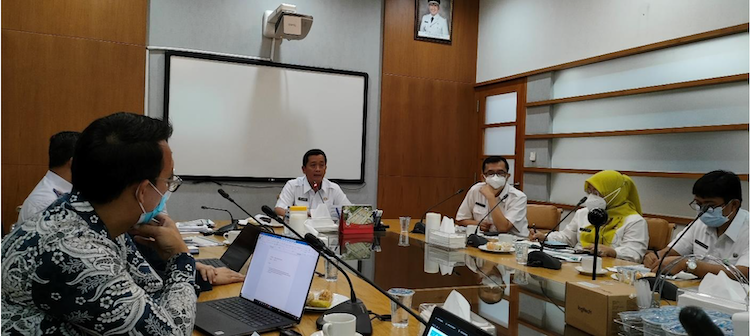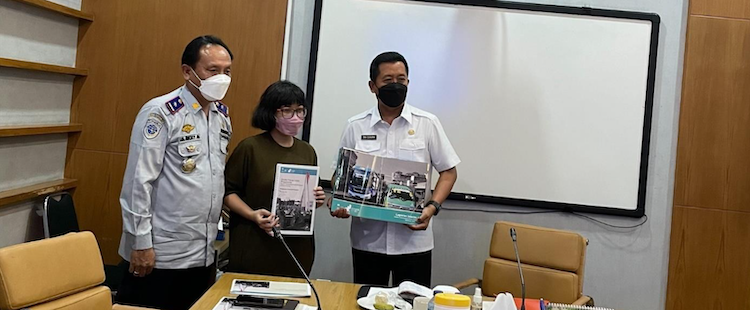Senior level meeting to secure future funding for implementation of GFCP recommendations in Bandung
Following up the programme meeting on 3 December 2021 with the Bandung Head of the City Planning Agency and Steering Committee, the City Transport Agency has formed the 'Mass Public Transport System' (SAUM) team for the implementation of the pre-trial of the proposed transport system, as proposed by the Global Future Cities Programme (GFCP) team. The first coordination meeting with the SAUM team on 16 March 2022 determined three key points: holding an audience meeting with the Head of the City Secretary, finalising the implementation plans (routes, operational plan, budget) and campaign and promotion - including socialisation with the existing operators.
To meet the objectives, on 30 March 2022, the intervention team established an audience meeting with the Head of City Secretary, which was also attended by the Head of the Steering Committee, Head of Transport Agency, Head of Administration Development, City Planning Agency and Transport Unit. The purpose of the meeting was to convey the programme's progress and its recommendations concerning the essential aspects of integrating public transportation in Bandung through the transformation of the existing Angkot industry.

The Bandung team in the audience meeting with the Head of City Secretary
The Head of the City Secretary expressed his gratitude for the GFCP's presence and its assistance to the City government in developing the public transportation plan. He clarified that traffic congestion had become a 'yearly issue' and neither the City leaders nor the Mayor had been able to resolve these problems. The Head of the City Secretary recognised that improving public transportation may well be the solution to Bandung's irresolvable traffic problems. He believes that this initiative has the potential to be the starting point for the transformation of Bandung's public transportation system towards sustainability. The meeting also provided assurances that the necessary support from the City government would be provided, including the budgeting allocation, supporting regulations, and consolidation amongst City agencies. These assurances are vital in ensuring the intervention is implemented in the long term.
In the meeting, it was noted that during the development and implementation plan, the GFCP team should focus on the following:
- The City Transport Agency, as the leading sector, should develop a measurable and tangible implementation plan, with assistance from the GFCP team.
- A viable and reliable public transportation system should become the focus of the implementation plans.
- Proposed implementation plans should consider upgrading current bus fleets into larger sizes (e.g. medium buses), improving the availability of bus information (e.g. schedules, routes and fare prices) and integrating existing public transportation modes instead of replacing them.
- Implementation plans should also consider the integration with National/Province/City planning (e.g. programmes surrounding Bandung Basin Metropolitan Area (BBMA))

City stakeholders were receptive of the team’s work and suggestions, good indicators that the intervention is influencing the City government
The acceptance and support from the Head of the City Secretary are valuable achievements of the programme. The intervention is already starting to influence the City government in achieving an inclusive and sustainable city.
Partner
Mott MacDonald (MM)
Country
Republic of Indonesia
City
Bandung
Themes
Strategy & Planning
Risk & Resilience
Author(s)

Kenny Kapuasiana
Assistant Project Manager, Bandung Integrated Public Transportation System Intervention